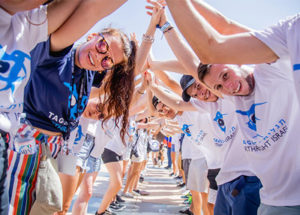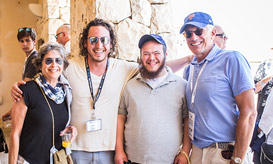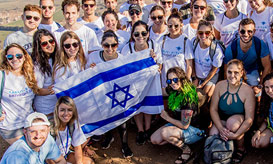When my husband Ed became involved in Birthright Israel Foundation, I was less of a participant…
We are in this battle and we lose time and time again, and not by chance. Let’s start with numbers that do not work in our favor: Jews make up only 0.2% of the world’s population, while one in four people in the world is Muslim. We will continue in countries in the Arab world that have been investing huge fortunes for years in defaming Israel, these efforts include millions of bots and social media pages, and placing students in key positions on US and European college campuses.
Then when an operation like “The Guardian of the Walls” begins, all of these PR enterprises have to do is press the “Activate” switch button to further promote the humanitarian narrative of the “occupying” strong versus the “occupied” weak and display pictures of children killed in Gaza which produced an emotional response on the cover of the NY Times and countless infographics and viral material that spread like wildfire. For dessert then, you add Bella Hadid & Co. with tens of millions of followers — and Israel’s starting point is impossible. All this allows anti-Semitism to spread, especially in the US. So what can be done?
The first is to focus on factual and thorough information among the decision-makers of the Western countries and to instill an orderly sub-presentation that presents the characteristics of the conflict, without background noises or gimmicks and the essential difference between them. The approaches of terrorist organizations and Israel’s approach in terms of morality, fighting an ideology, the sanctity of human life, the use of violence as a solution and so on must be emphasized.
Second, we need to better characterize the target audiences and focus on the “convinced” or “indifferent,” but on the “swaying” and “embarrassed,” those sitting on the fence, unsure of what to think. What messages should be conveyed to them? Simple to digest and uncomplicated: Hamas is a murderous terrorist organization and Israel wants life, Israel is a country of ideals, but does not pretend to present itself as an ideal state. It may not bring about real change, but our presence there in time of war is a must, this arena cannot be abandoned. The third is to speak of Israel’s strengths to the world precisely in ordinary days and not just in times of war. Tourism can be part of the solution.
The last, strategic, and most important tool in the long run, is to strengthen tourism to Israel and educational tourism in particular.
Why educational tourism? Because it provides the most authentic, unmediated, highly effective experience, and broadens horizons, by the way – not just for Jews.
The Taglit project (Birthright Israel) was established 20 years ago and is currently the largest educational-tourism project in the world. 750,000 young Jews have participated in it to date, (in marketing language this is about 35% penetration and is a huge success). The vast majority of young people who come to Israel as part of discovery do not know Israel other than what they heard on campus, i.e. partial information and often very distorted, even false. Most of them did not know that IDF soldiers boarding the bus are young people very similar to them but were born into the obligatory reality of compulsory service. In the Land of Israel – certainly not as their parents remember that Jews had nowhere to go just 73 years ago.
About 85% of Taglit’s (Birthright Israel) participants define the tour of Israel as an experience of a lifetime. Every brand should be jealous of such data. The discovery experience strengthens the Jewish identity, the connection to Israel, and, no less important, to Israelis. In studies we conducted after we found that Taglit (Birthright Israel) graduates did not open CNN to hear what was happening in Israel, but chose to call their Israeli friends to hear what was actually happening in the field. I have no doubt that the result of the studies after Operation The Wall Guard will be the same.
Taglit (Birthright Israel) participants return to their country and maintain contact with Israel – whether they return here at the next opportunity they have, or whether they host the friends they knew in Israel. Many of them work with Israeli companies, some become members of Congress or political activists and have an influence on decisions related to Israel. And you know what – even those who will not open a political, political or business career – even those who will have a small talk with their colleagues about Israel’s next operation and say “look, when I was in Israel…” – they are all ambassadors, they have a real connection with Israel.
And why tourism in general? Think of everyone you know who has visited Israel, whether he is a Jew or not, whether you have hosted him in your home or helped him on the street to reach his objective. Maybe he just came to the Eurovision Song Contest or the Giro Bike or for a few days for business meetings. The tourist who visited here will probably think twice before listening to Bella Hadid or other superficial messages on the internet or social media. Whoever was here, saw with his own eyes, met Israelis, experienced, tasted, asked difficult questions, has a different perspective. He understands that there is life here, for all that that implies, and far beyond the battles and wars that are constantly presented to him in the media. Each such has a profound effect on their immediate circles.
Now we have to work on all fronts. Tourism needs to be rehabilitated and as many people as possible brought to Israel. This is the order of the hour.
Please note this article was originally published in Hebrew.













